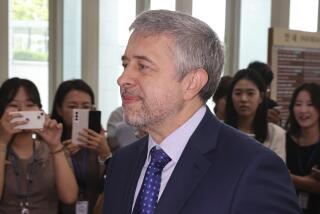U.S., N. Korea Open Talks on Missile Issue
- Share via
WASHINGTON — After a 16-month interval, U.S. and North Korean negotiators in New York on Thursday resumed high-stakes talks that a jittery West hopes will rein in the hermit nation’s growing missile development and export programs.
The two-day session comes a month after the Communist regime surprised and angered its neighbors, as well as Washington, by launching a satellite that the United States initially believed to be a ballistic missile.
Although the solid-fueled third stage of the rocket failed and the small satellite payload was destroyed, the rocket flew in an arc over Japan, raising fears in Tokyo of unexpected military vulnerability.
“The three-stage [rocket] means they are much further along than we had thought, much further along” in efforts to build long-range missiles, a senior U.S. official warned.
He called the Pyongyang regime “the only government in the world that’s truly dangerous” to world peace because of its known nuclear potential and immediate military threat to South Korea, where the U.S. maintains about 37,000 troops.
Meanwhile, the United States warned North Korea on Thursday of “very negative consequences” if Pyongyang further tests or exports long-range missiles.
State Department spokesman James P. Rubin said the Aug. 31 launch was another step forward in North Korea’s missile development program and called it a matter of “deep concern” to the United States.
“We intend to make quite clear to the North Koreans that, if they were to proceed with additional launches or were to export such missiles, there will be very negative consequences for our policy,” he said.
The CIA has told Congress that it did not foresee Pyongyang’s ability to build a three-stage rocket and that it considers North Korea’s missile development program the most advanced of any hostile state, ahead of both Iran and Iraq.
In addition, the CIA warned that later this year North Korea may test a Taepo Dong-2 intercontinental ballistic missile with a potential range of up to 3,600 miles, enabling it to reach Alaska or Hawaii.
Intelligence officials also say North Korea earns desperately needed hard currency by selling an estimated $1 billion a year in ballistic-missile technology and equipment to such countries as Iran and Syria. Another past customer is Pakistan, which detonated several underground nuclear devices in May in response to similar tests by India.
The rocket launch by North Korea weakened already lukewarm congressional support for a landmark 1994 pact that essentially pays Pyongyang to stop producing plutonium, which can be used for nuclear weapons.
Under the so-called framework agreement, the U.S. promised to provide North Korea with 500,000 tons of fuel oil a year. South Korea and Japan agreed to pay the bulk of the estimated $4.5 billion for construction of two light-water nuclear power plants to replace North Korea’s plutonium-producing reactors.
But, angered by the rocket launch as well as the recent discovery of a vast underground site in North Korea that U.S. intelligence officials believe is being used for nuclear weapons development, Congress has refused to appropriate any money for the program next year.
The White House insists that the 1994 pact is the only effective mechanism to restrain Pyongyang’s nuclear program and warns that a failure to meet U.S. commitments could incite Kim Jong Il’s regime to resume production of plutonium.
As a result, President Clinton used his executive authority Wednesday to shift up to $15 million from anti-terrorism, nonproliferation and other purposes to a program to buy 150,000 tons of heavy fuel oil for North Korea. So far this year, North Korea has received 216,000 tons; a State Department spokesman said the shortfall from the agreed-upon 500,000 tons was being met by shipments from other countries.
A U.S. team is heading to North Korea in coming weeks in an effort to gain access to the underground site where nuclear weapons development is suspected, a senior Clinton administration official said Thursday. Administration officials have told Congress that such access is considered essential by the U.S.
Meanwhile, even supporters say the 1994 pact may need to be revised.
Said a Capitol Hill staffer who follows the issue: “There’s general agreement that either the agreed framework was a lousy agreement from the beginning and never should have been agreed to--or, alternatively, whether it was reasonable or not in 1994, the North Koreans, with their actions since then, have made it irrelevant and it’s time to replace it.
“The problem is [that] none of the critics address the issue of what will we do if you walk out of the agreement and the North Koreans start increasing their plutonium stockpiles. So, instead of having enough fissile materials for at best one or two bombs, you get enough for 10 or 20 a year.”
He said the 1994 accord was based in part on an overly optimistic assessment that the Pyongyang regime would soon collapse. In addition, the Asian financial crisis has put unexpected burdens on the ability of Japan and South Korea to pay their share.
The missile talks in a mid-Manhattan office building are the first since June 1997; the U.S. delegation was led by Assistant Secretary of State Robert Einhorn. The North Korean group was led by Han Chang On, a U.S. expert in Pyongyang’s Foreign Ministry.
More to Read
Sign up for Essential California
The most important California stories and recommendations in your inbox every morning.
You may occasionally receive promotional content from the Los Angeles Times.














